Seattle Seahawks Quarterback RUSSELL WILSON answered random questions from selected media including CHANNEL A TV during Super Bowl XLIX media week in Arizona.
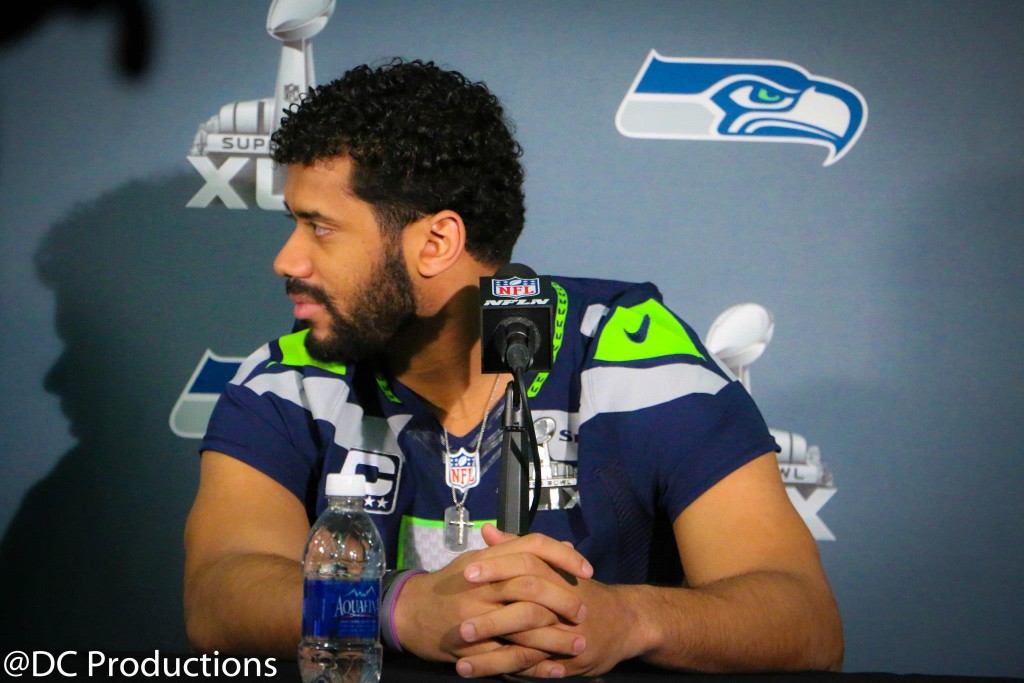
Not every star quarterback has to stand 6-3 or taller. Russell is living proof of this. What he lacks in height he makes up for with speed, agility and a knack for spotting open passing lanes. That, combined with a strong arm, an ability to avoid trouble, and a devotion to preparation puts him on an even par with the best passers in the NFL. Every game, it seems, he gains a deeper understanding of the quarterback position.
Russell can engineer a drive gobbling up yards in small bites, but he is always a big-gain threat, whether he’s throwing or running. He is a vocal leader who turns skeptics into believers. In just his second season, he had teammates believing they can beat any opponent and win any game. Like Bobby Layne, Russell never believes he’s lost—he just ran out of time.
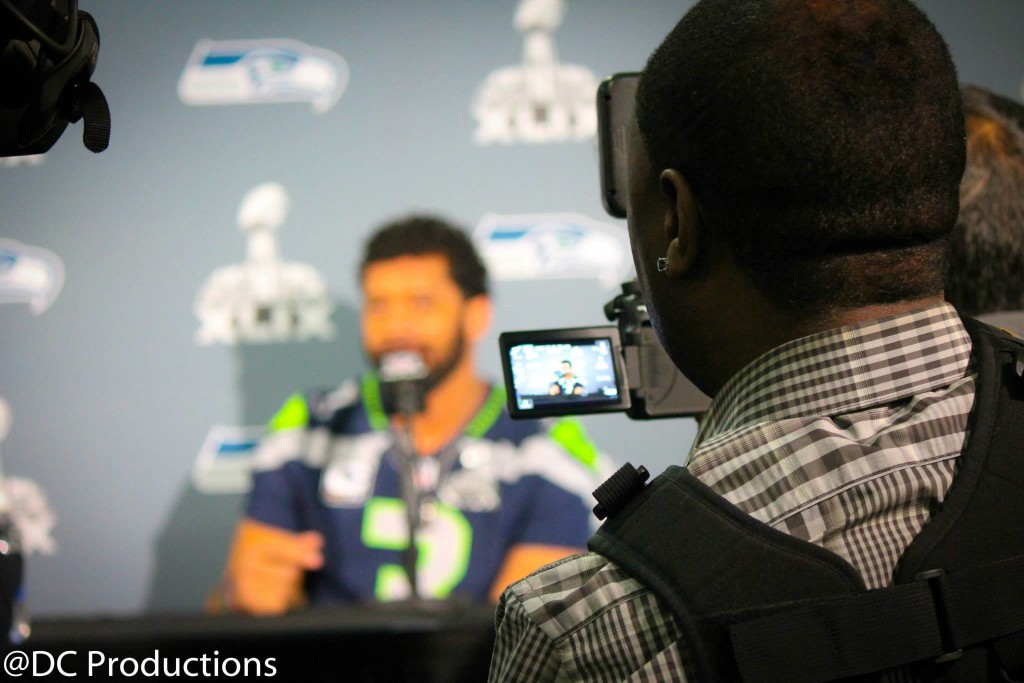
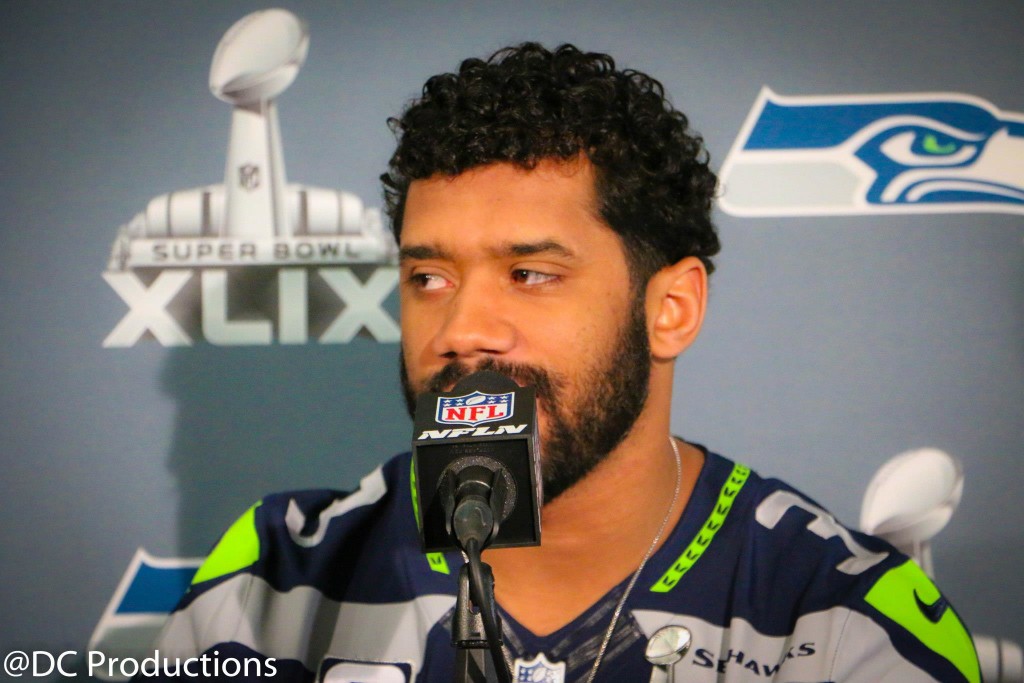
GROWING UP
Russell Carrington Wilson was born on November 29, 1988 in Cincinnati, Ohio. He was the second of three children born to Tammy Wilson and Harrison Wilson III. He has an older brother, Harrison IV, and a younger sister, Anna.
The Wilson family was extremely athletic. Russell’s grandfather was a two-sport star at Kentucky State University in the 1950s. Russell’s father starred in football and baseball for Dartmouth in the 1970s. After failing to catch on with the San Diego Chargers in 1980, he focused on a career in law. He moved the family to Richmond after earning his law degree at the University of Virginia. Russell’s mother worked as a legal nurse consultant.
When Harrison Jr. saw Russell swing a Wiffle Ball bat, he announced to the family that his toddler grandson was destined to do great things in sports. Russell began playing football as a 4-year-old and honed his skills throwing to his brother, a fleet-footed receiver. Russell had some foot speed himself, but it was his strong arm that eventually earned him the starting job for the Collegiate School as a sophomore. Russell led coach Charlie McFall’s team to the 2004 state championship that year, and earned All-State honors.
As a junior, Russell was named the Richmond Times-Dispatch Player of the Year. He took the Cougars to a second state title, tossing 40 touchdown passes and running for 15 more. He threw for more than 3,000 yards. Russell’s hope was to be recruited by the University of Virginia. But his height—a tick over 5–10—scared off the Cavaliers recruiters. He received scholarship offers from NC State and Duke after his junior season and accepted the Wolfpack’s offer prior to the start of his senior year.
That season produced a third straight championship in 2006. Russell threw for 3,000-plus yards again and combined for 52 touchdowns in the air and on the ground. He was also the star of Collegiate’s baseball and basketball teams. In the spring of 2007, Russell was selected in the 41st round by the Baltimore Orioles. He was tempted to sign, but decided a college education was more important.
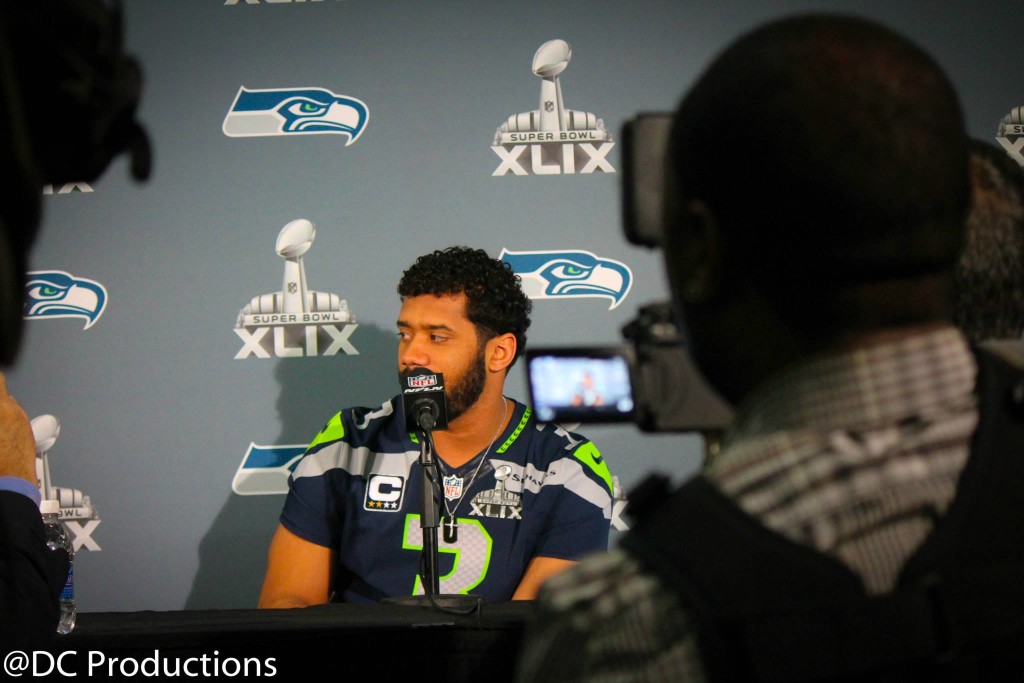
ON THE RISE
Russell arrived in Raleigh and sat out his first varsity season as a redshirt, but he did lay infield for the Wolfpack baseball team as a freshman. The 2008 football season found Russell battling two other players for snaps. By midseason, however, he had secured the job as coach Tom O’Brien’s starter. Russell and the Wolfpack were perfect in November, defeating Duke and Wake Forest in close games, and then rolling up big scores against UNC and Miami.
The four wins turned around a potentially disastrous 2–6 start and secured a bid for NC State in the Papa John’s Bowl (aka as the Birmingham Bowl) against Rutgers. Russell guided his team to a 17–6 halftime lead with 232 combined yards, but he was forced to leave the game in the third quarter with a knee injury. Rutgers scored 13 points in the final period to earn the victory. Nevertheless, Russell was an easy pick for ACC Rookie of the Year.
Though barely 20, Russell was already an incredibly efficient field general. As a freshman, he threw for 17 touchdowns and just one interception. All told he completed 150 of 275 passes for 1,995 yards. He also ran for four touchdowns. Russell threw his second college interception in the third game of his sophomore season. He had thrown 379 passes between the two picks to break Andre Woodson’s all-time NCAA record.
The 2009 campaign, however, proved to be a letdown. The Wolfpack defense allowed more than 30 points eight games in a row, and the team managed to win only two of those contests. The only bright spots in a dismal season was a 65-point performance against Murray State, and a 28–27 win over the rival Tar Heels in the final game of the regular season. Russell threw for 3,027 yards, with 31 TDs against 11 interceptions.
The team’s fortunes changed in 2010, as Russell led the ACC in passing yards and total offense. He completed 308 passes for 3,563 yards and 28 touchdowns, with just 14 interceptions. He was also the conference’s top rushing QB, with 435 yards and nine touchdowns. The Wolfpack went 8–4 in the regular season, with three of those losses coming against nationally ranked teams. NC State defeated Florida State 28–24 when the Seminoles were ranked in the Top 20. The Pack trailed 24–21 late in the final period when Russell connected with George Bryan on a short pass to win the game. He capped off his junior year with a 23–7 win over West Virginia in the Champs Sports Bowl to sneak into the Top 25 year-end rankings. Russell threw a pair of scoring passes and finished with 275 yards.
Russell son found himself with some interesting options. He had already completed enough credits to earn his undergraduate degree. Prior to his senior football season, he played in the minors for the Colorado Rockies, who had drafted him in the 5th round that June. After the Champs Sports Bowl, he had decided he would report to Spring Training with the Rockies. Coach O’Brien was uncomfortable with this decision, and decided to begin developing other quarterbacks for the 2011 season. He consequently released Russell from his football obligations with NC State.
Technically, Russell could have entered the NFL draft. However, he received little interest from pro scouts and was not invited to participate in the spring combines. Because he had a year of college football eligibility left, Russell decided to transfer to the University of Wisconsin. Badgers coach Bret Bielema was fine with Russell playing baseball that summer. He appeared 61 games for the Class-A Asheville Tourists and batted .228 with three home runs.
Russell arrived in Madison for the 2011 football season ready to take over a talented squad. The Badgers had gone 11–2 the year before and played in the Rose Bowl. Quarterback Rick Tolzien had graduated, leaving the team without an experienced leader. Russell would fill that role for one year. He digested the entire playbook within three weeks and was named team captain shortly thereafter.
In his first game, Russell dropped 51 points on UNLV, with six coming on a 46-yard TD run. Wisconsin started the year 6–0, with Russell rolling up huge scores with his pinpoint passing. During that run, the Badgers outscored their opponents by an eye-popping 301–58 margin. Narrow road losses to Michigan and Ohio State were the only hiccups on the way to a historic 10–2 regular season. The Badgers finished first in the Big Ten’s Leaders Division and earned a berth in the first Big Ten Championship Game, against Michigan State.
Russell starred in a high-scoring seesaw battle that featured a game-winning 64-yard drive. He made the play of the game on fourth down at the Michigan State 43-yard line. He twisted away from a near-sack and launched a desperate bomb to Jeff Duckworth, who snared it in the red zone. Montee Ball ran the ball in on the next play for his fourth touchdown of the game. The Badgers won 42–39, and Russell was named MVP.
The Big Ten champs lost their final game, bowing to Oregon in the Rose Bowl, 45–38. Russell threw for 296 yards and a pair of touchdowns, but he could not get the Badgers in the end zone in the fourth quarter as the Ducks score 10 unanswered points.
In his final college season, Russell completed 72.8% of his passes and set an FBS record with a passing efficiency rating of 191.8. His 33 scoring tosses set a school record and were second all-time in Big Ten history to Drew Brees’s 39 TDs in 1998. Russell threw only four interceptions all year.
After the lack of interest following his junior year, Russell was taking no chances. He played in the Senior Bowl, suiting up for the North team, which was coached by the staff of the Minnesota Vikings. Russell started the game and led the North to a 13–6 halftime lead. Kirk Cousins finished off the team’s 23–13 win. After the game, Russell informed the Rockies that he was through with baseball. He would enter the NFL draft.
At the combine that winter, Russell opened a lot of eyes. His size was still a big issue, but his performance boosted his outlook from a mid-round pick to a potential second- or third–rounder. The Seahawks grabbed him in the third round, with the 75th selection in the draft. It was the highest pick the team had used on a quarterback since taking Rick Mirer with the second overall choice in 1993.
Headed into camp that summer, Matt Flynn was the popular pick to secure the Seattle starting job. But everything the Seahawks asked Russell to do, he did better and faster than they expected. Two days after Seattle’s final preseason contest, coach Pete Carroll named his rookie the regular-season #1 signal caller. Russell had run a similar West Coast style offense at both of his college stops, so he felt right at home in Seattle’s system.
In the opener, Russell held his own in a close loss to the Arizona Cardinals. The following week, he engineered an impressive 90-yard third-quarter scoring drive against the Dallas Cowboys in a 27–7 victory. The Seahawks had an exceptional runner in Marshawn Lynch and a superb defensive unit, so Russell was not asked to do too much.
MAKING HIS MARK
That changed in Week 3. The Seahawks were hosting the Green Bay Packers in a Monday Night Football game and were looking down the barrel of a 12–7 loss. With no time left on the clock, Russell heaved a desperate pass into the corner of the end zone. Golden Tate pushed one defender out of the way and outwrestled another for the ball to win the game. It took 10 minutes before the replacement officials determined that the play would stand. The controversial play went far to end the league’s referee lockout.
Russell was learning on the job, and often it showed. But then there were games that suggested he was poised to become a top NFL quarterback. He rarely panicked, yet he knew when to abandon the pocket and let his legs make plays. His passing efficiency got better as the season wore on.
The team’s record stood at 6–5 at the end of November. In Seattle’s first December game, Russell engineered an overtime win over the Chicago Bears and earned NFC Player of the Week honors. At that point, something clearly clicked. The Seahawks ran the table, winning their next three games by scores of 58–0, 50–17 and finally a 42–13 victory over the division-rival San Francisco 49ers. Seattle finished the year 11–5 after a comeback win over the St. Louis Rams.
Russell’s final numbers were extraordinary for a rookie. He completed 64.1% of his passes and racked up 3,118 yards. He threw for 26 touchdowns against only 10 interceptions, and also ran for 489 yards and four touchdowns. In almost any other season, Russell would have been a lock for Rookie of the Year. But in 2012, Andrew Luck was making headlines with the Colts. Nevertheless, Russell edged the Indianapolis QB for the award.
In the opening round of the playoffs, Russell was matched up against the NFL’s other rookie sensation, Robert Griffin III. The Washington Redskins put two touchdowns on the board in the first quarter, but it was all Seahawks after that. Russell completed 15 passes for 187 yards and ran for 67 more in a 24–14 road win. It snapped an eight-game postseason losing streak in away games for the Seahawks. Russell led four scoring drives of 60 yards or more.
In the next round, the Atlanta Falcons stunned Seattle’s defense with 20 unanswered first-half points. Undaunted, Russell spearheaded a wild comeback that saw the Seahawks regain the lead 28–27 with 31 seconds left. However, the defense could not contain Matt Ryan, who completed a pair of long passes to set up the game-winning 49-yard field goal. It was a sudden and stunning end to an otherwise magnificent rookie season—by any measure one of the finest every produced by a third-round quarterback. Against the Falcons, Russell passed for 385 yards—the most ever by a rookie in the postseason. The previous record, set by Sammy Baugh, had stood for 75 seasons.
For the first time in several seasons, the Seahawks entered the 2013 campaign knowing who their starting quarterback would be. The only question was whether Russell could continue to grow. He’d taken the league by surprise in 2012, but now opponents would be ready for him. Also, Seattle was rated as one of the top two or three teams in the NFL, and those expectations added to Russell’s burden.
After squeezing out an opening week victory over Cam Newton and the Carolina Panthers, Russell squared off with Colin Kaepernick and the 49ers—the defending NFC champs. Playing in front of a deafening home crowd, the Seahawks dismantled San Francisco, 29–3. Twomore wina followed before Seattle dropped its first game, to the Colts.
Russell and the Seahawks found another gear after that. They seized control of the NFC West with 10 wins in their first 11 games, and Russell was among the Top 10 in completion percentage, touchdowns and QB rating. Against Tampa Bay in early November, Russell engineered the greatest comeback in team history. The Seahawks trailed 21–0 late in the first half, but Seattle scored closed the gap to 24–17 in the fourth quarter. With under two minutes left, Russell lofted a 10-yard scoring pass to Doug Baldwin to knot the score. He then led a nine-play drive in OT to set up the winning field goal by Steven Hauschka for his third comeback win of the season.
Russell followed this nail-biter with blowout wins over the Falcons and then the Vikings. The Minnesota game marked the fifth straight time Russell threw multiple TD passes. He recorded just two interceptions during that stretch.
Seattle went on to finish 13-3. A win over the Rams on the season’s last Sunday clinched homefield advantage for the Seahawks, making them the clear favorites to represent the NFC in Super Bolw XLVIII. Russell ended the year with 26 touchdown passes against just seven interceptions. His QB rating surged to 101.2. He was mentioned in virtually every conversation about the league MVP. In just his second pro season, Russell has proven to be both the spark and the caretaker of the Seattle offense–and the key to the team’s championship hopes.
Ref: CHANNEL A TV and JOCKBIO

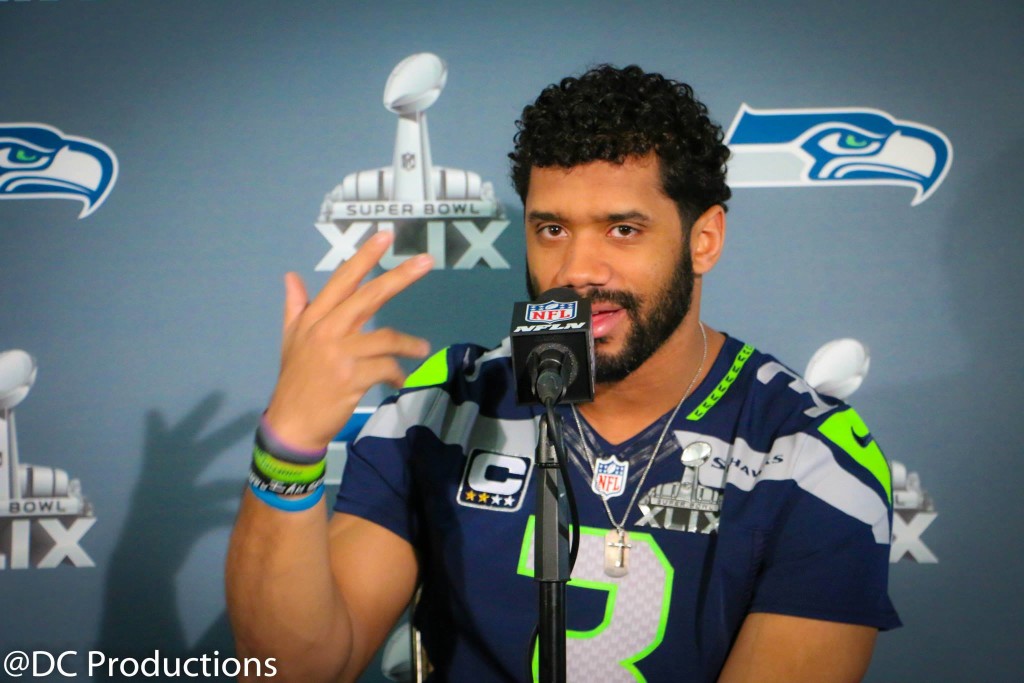
Thanks-a-mundo for the blog.Really looking forward to read more. Much obliged.